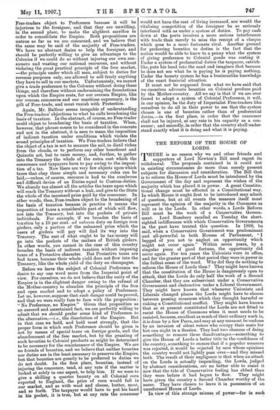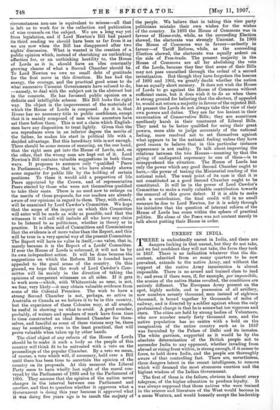1.11.6 REFORM OF THE HOUSE OF LORDS.
ITIHERE is no reason why we and other friends and 1 supporters of Lord Newton's Bill need regret its withdrawal. The proposals contained in it could not in existing circumstances do more than merely present subjects for discussion and consideration. The Bill that is to reform the House of Lords must be introduced by the Government of the day and represent the wishes of the majority which has placed it in power. A great Constitik tional change must be effected in a Constitutional way. In which House it ought first to be introduced may admit of question, but at all events the measure itself must represent the opinion of the majority in the Commons as well as in the Lords. In other words, a Lords Reform Bill must be the work of a Conservative Govern- ment. Lord Rosebery recalled on Tuesday the short, sighted indifference with which Conservative Governments in the past have treated this question. In 1888, he said, when a Conservative Government was predominant and all-powerful in both Houses of Parliament, "I begged of you not to neglect an opportunity which might not occur again." Within seven years, by a singular piece of good fortune, the opportunity did occur again. For ten years the Unionists were in office, and for the greater part of that period they were in power in the fullest sense of the word. Why did they do nothing to reform the House of Lords then ? They might have known that the constitution of the House is dangerously open to attack, that the Lords do only half the work of a Second Chamber, that they are subservient under a Conservative Government and obstructive under a Liberal Government. They might have known that whenever Unionists and Liberals changed places the Lords might have to choose between passing measures which they thought harmful or risking a Constitutional conflict. They might have known that as at present constituted the Lords are not fitted to resist the House of Commons when it most needs to be resisted, because, excellent as much of their ordinary work is, it is done by a few Peers, and may at any moment be undone by an invasion of silent voters who occupy their seats for but one night in a Session. They had two chances of doing something to remove these disadvantages—something to give the House of Lords a better title to the confidence of the country, something to ensure that if a popular measure was rejected, it would be rejected by men whose opinion; the country would not lightly pais over—and they missed both. The result of their negligence is that when an attack on the Lords is actually impending, the Lords, judged by abstract considerations, are no better able to resist it now that the tide of Conservative feeling has ebbed than they were before it had begun to flow. They might have given the country a Second Chamber worthy of the name. They have chosen to leave it in possession of an unreformed House of Lords.
In view of this strange misuse of power—for in suck circumstances non-use is equivalent to misuse—all that is left us to work for is the collection and publication of wise counsels on the subject. We are a long way yet from legislation, and if Lord Newton's Bill had passed its third reading we should have been as far from it as we are now when the Bill has disappeared after two nights' discussion. What is wanted is the creation of a public opinion which, instead of cherishing an unthinking affection for, or an unthinking hostility to, the House of Lords as it is, should have an idea constantly growing clearer of what a Second Chamber should be. To Lord Newton we owe no small debt of gratitude for the first move in this direction. He has had the energy, the courage, and the practical good sense to do what successive Unionist Governments have refused to do, —namely, to deal with the subject not in the abstract but in the concrete. He has focussed public opinion on a definite and intelligible scheme. His Bill looks the right way. Its object is the improvement of the materials of which the House of Lords is composed. As it is, that House has no necessary title to public confidence, except that it is mainly composed of men whose ancestors have sat there before them. This is not a claim which English- men have any disposition to treat lightly. Given that the son reproduces even in an inferior degree the merits of the father, he makes his start in political life with a decided advantage. But this hereditary title is not enough. There should be some means of ensuring, on the one band, that the right men get into the House of Lords, and, on the other, that the wrong men are kept out of it. Lord Newton's Bill contains valuable suggestions in both these ways. It proposes to 8111i1M011 only "qualified " Peers to Parliament,—Peers, that is, who have already shown some capacity for public life by the holding of certain positions. To these it would add a proportion of life Peers appointed by the Crown, and of representative Peers elected by those who were not themselves qualified to take their seats. There is no need now to enlarge ou the merits of these proposals, for our readers are already aware of our opinions in regard to them. They, with others, will be examined by Lord Cawdor's Committee. We hope that the scope of the inquiry on which this Committee will enter will be made as wide as possible, and that the witnesses it will call will include all who have any claim to be listened to as politicians, whether in theory or in practice. It is often said of Committees and Commissions that the evidence is of more value than the Report, and this will be true in a very special way of the present Committee. The Report will have no value in itself,—no value, that is, merely because it is the Report of a Lords' Committee. If ever the House of Lords is reformed, it will not be by its own independent action. It will be done because the suggestions on -which the Reform Bill is founded have appealed to the good sense of the country. On this ground, we hope that the work of Lord Cawdor's Com- mittee will lie mainly in the direction of taking the opinions of competent witnesses on all sides. If it gets to work soon—which, with Whitsuntide so near, is not, we fear, very likely—it may obtain valuable evidence from some of the Colonial Premiers. The wish to have a strong Second Chamber is not, perhaps, so active in Australia or Canada as we believe it to be in this country, but the experience of these Colonies may, at all events, be useful in showing us what to avoid. A good number, probably, of writers and speakers of mark have from time to time constructed an ideal Second Chamber for them- selves, and fanciful as some of these visions may be, there may be something, even in the least practical, that will prove valuable when taken up by other hands.
The chief object of any reform of the House of Lords should be to make it such a body as the people of this country will think fit to be entrusted with a veto on the proceedings of the popular Chamber. By a veto we mean, of course, a veto which will, if necessary, hold over a Bill until there has been time to ascertain the opinion of the country on its proposals. At this moment the Liberal Party seem to have wholly lost sight of the moral con- veyed by the Parliament of 1893 and by the Parliament of 1905. They assume that the opinion of the nation never changes in the interval between one Parliament and another, and that to question whether it approves what a Government is doing this year because it approved what it wan' doing five years ago is to insult the majesty of
the people.. We believe that in taking this view party politicians mistake their own wishes for the wishes of the country. In 1893 the House of Commons was in favour of Home-rule, while, as the succeeding Election showed, the electorate was strongly Unionist. In 1905 the House of Commons was in favour—ardently iii favour—of Tariff . Reform, while, as the succeeding Election showed, the electorate was equally ardent on the side of Free-trade. The present majority in the House of Commons are all for abolishing the veto of the Lords, because they fear that some of their Bills may not pass unscathed through the ordeal of a second investigation. But though they have forgotten the lessons of 1893 and 1905, we greatly doubt whether the nation has an equally short memory. It does not wish the House of Lords to go against the House of Commons without sufficient cause, but it does wish it to do so when there is strong ground for believing that the electors, if appealed to, would not return a majority in favour of the rejected Bill. At present the Lords do not always take this view of their own powers and duties. They are far too lenient in their examination of Conservative Bills; they are sometimes needlessly harsh in their treatment of Liberal Bills. They need to be better qualified for using their great powers, more able to judge accurately of the national feeling, more resolved not to set themselves against what appears to be the national feeling unless they.have good reason to believe that in this particular instance appearance is not reality. To talk about improving the relations between the two Houses—meaning by that the giving of undisputed supremacy to one of them—is to misapprehend the situation. The House of Lords has only the power which any good Second Chamber ought to have,—the power of testing the Ministerial reading of the national mind. The weak point of its case is that it is not constituted as a good Second Chamber ought to be constituted. It will be in the power of Lord Cawdor's Committee to make a really valuable contribution towards the removal of this grave defect. If it is able to make such a contribution, the final credit will in no small measure be due to Lord Newton, for it is solely through his initiative that the question of internal reform of the House of Lords has come within the sphere of practical politics. He alone of the Peers was not content merely to talk about putting their House in order.











































 Previous page
Previous page